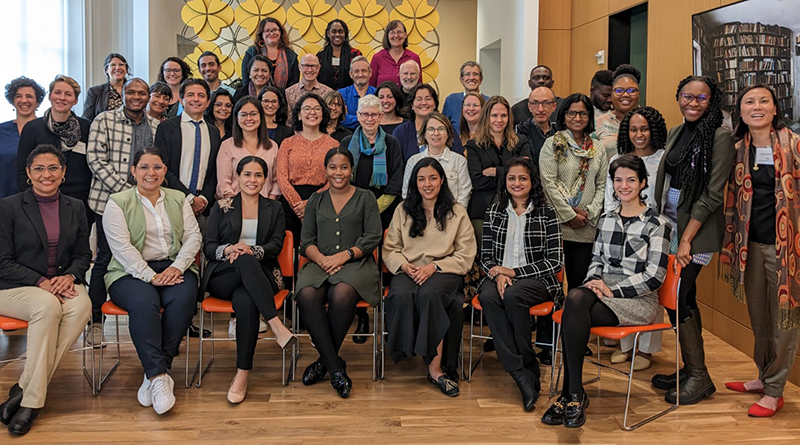The Global Food Research Program’s research with the Bloomberg Philanthropies Food Policy Program is supported by a global Evaluation Advisory Committee (EAC). This committee of global scholars considers potential partners and reviews research proposals, including designs and major products from each study. The EAC meets annually with the GFRP team and all collaborating research teams from Mexico, Brazil, Chile, Peru, Colombia, South Africa, and any new countries.

Co-chairs

Barry M. Popkin
Dr. Popkin is W. R. Kenan, Jr. Distinguished Professor of Nutrition at the University of North Carolina at Chapel Hill. Dr. Popkin’s work on diet, physical activity, and obesity-related research in the United States and globally has focused on the concept of the Nutrition Transition, the study of the dynamic shifts in dietary intake and physical activity patterns, and on trends in obesity and other nutrition-related, non-communicable diseases. Dr. Popkin’s research program focuses globally on understanding the shifts in stages of the nutrition transition and on programs and policies to improve population health linked with this transition. This has included his involvement in several randomized controlled trials in the United States and Mexico as well as longitudinal, cross-sectional and other epidemiological studies, global ecological analyses, review articles, papers on hydration, membership in beverage guidance patterns for several governments (e.g., Mexico, China) and many related activities.

Juan A. Rivera
Dr. Rivera is a Senior Professor-Researcher and former General Director at the National Institute of Public Health in Mexico (INSP). He was the Founding Director of the Center for Research in Nutrition and Health at INSP, He is also a professor at the School of Public Health of Mexico and an adjunct professor at the Rollins School of Public Health, Emory University, Atlanta, Ga. He is a Commissioner of EAT-Lancet 2.0, a member of the Mexican National Academy of Medicine and National Academy of Sciences, of the American Society of Nutrition, and of the Latin American Society of Nutrition, of which he was president. His research interests include the epidemiology of malnutrition in all its forms, birth cohort studies focusing on risk factors for malnutrition, the generation of evidence for the design of policy actions for the prevention of malnutrition in all its forms and the evaluation of nutrition policy. He is the author of more than 645 scientific publications and has given more than 800 presentations.
International distinguished members

Harold Alderman
Dr. Alderman is Senior Research Staff in the division of Poverty, Health, and Nutrition at the International Food Policy Research Institute (IFPRI). Dr. Alderman’s research has focused on the economics of nutrition and food policy. He spent 10 years at the IFPRI prior to joining the World Bank in 1991, after which he rejoined IFPRI in 2012. While at the World Bank, he divided his time between the Development Research Group and the Africa region where he advised on social protection policy. His current research focuses on linkages between nutrition and early child development and the means by which nutrition and social protection programs contribute to long-term economic growth.

Jennifer L. Harris
Dr. Harris is a Senior Research Advisor at the Rudd Center for Food Policy and Health at University of Connecticut and an independent consultant. Dr. Harris’s research examines the extent and impact of exposure to food marketing, especially on children and adolescents. Her research findings have been widely used by the health community and policymakers to improve the food marketing environment surrounding children. Dr. Harris’s current research focuses on marketing and public health, with an emphasis on effects of food marketing on behaviors, attitudes and motivation in children and adults. She has conducted extensive research to quantify the amount and types of food marketing seen by young people and its impact on their health and diets. She also has written on the psychological and behavioral effects of marketing to children and teens on their diets and health. Her current research areas of focus include targeted marketing to Black and Hispanic youth, the extent and impact of marketing to youth on mobile devices, and effects of food marketing on what and how parents feed their babies and young children.

Corinna Hawkes
Dr. Hawkes is Director, Division of Food Systems and Food Safety for the Food and Agriculture Organization of the United Nations. Between 2016 and 2023 she was Director of the Centre for Food Policy, City, University of London and Co-Chair of the Global Nutrition Report, an international report tracking progress in malnutrition in all its forms across the globe. Her work concerns identifying and analysing food systems policies for improved diets, food security and nutrition. She has published widely on the role of globalisation, trade, retailing and agriculture in diet and diet change around the world. Her current research looks at the role of food supply chains in improving diet and nutrition. Corinna has worked at the International Food Policy Institute, the World Health Organization, the University of Sao Paulo and the World Cancer Research Fund International, where she established the NOURISHING Policy Framework for healthy diets and obesity. She sits on the International Panel of Experts on Sustainable Food Systems (IPES-Food), the EAT-Lancet Commission on Healthy Diets from Sustainable Food Systems and the Lancet Obesity Commission.

Tilakavati Karupaiah
Dr. Tilakavati Karupaiah is Strategic Research Interests Professor at the Faculty of Health and Medical Sciences, Taylor’s University in Malaysia. She was formerly Head of the Dietetics Program, National University of Malaysia. Her research is related to health and disease bridging human clinical trials to nutritional epidemiology to the food environment. Dr. Karupaiah contributes towards legislation, clinical practice, education and research in the field of cardiovascular and renal nutrition in Malaysia. Her agenda now is prevention of non-communicable diseases (NCDs) through generating evidence on food behavior patterns related to obesity and NCDs risk and food policy research on government performance and food industry commitments towards population nutrition and a ‘healthy’ food environment. She is currently working with the INFORMAS (International Network for Food and Obesity / non-communicable diseases Research, Monitoring and Action Support) network for capacity building in a food environment project involving Malaysia and 8 other Asian countries. She is also contributing extensively to chronic kidney disease research as a nutrition expert and educator. Dr. Karupaiah was the 2017 recipient of the Joel D Kopple Award from the National Kidney Foundation which honors individuals who make significant contributions in renal nutrition.

Guillermo Paraje
Dr. Paraje is a professor of economics at the Universidad Adolfo Ibáñez Business School in Chile. He specializes in health economics topics such as health equity, health systems, and non-communicable diseases. Relating to non-communicable diseases, he has developed policy-oriented research to implement effective tobacco, alcohol, and sugar-sweetened beverage control policies in Latin American countries. He has been a Consultant for the World Bank, the World Health Organization, the United Nations Development Program, UNICEF, among other organizations. He was also a member of a Presidential Commission to Reform Health Insurance in Chile. In 2018 he was distinguished by the World Health Organization with the No Tobacco Day Award in the Americas, for his outstanding contributions to the economics of tobacco control. Dr. Paraje received his bachelor’s in economics from the University of Córdoba in Argentina, and a Master of Philosophy and PhD in Economics from the University of Cambridge, United Kingdom.

Boyd Swinburn
Dr. Swinburn is the Professor of Population Nutrition and Global Health at the University of Auckland and Alfred Deakin Professor and Director of the World Health Organization (WHO) Collaborating Centre for Obesity Prevention at Deakin University in Melbourne. He trained as a specialist endocrinologist and has conducted research in metabolic, clinical and public health aspects of obesity. His major research interests center on community and policy actions to prevent childhood and adolescent obesity, and reduce what he has coined the “obesogenic” food environment. He is Co-Chair of the World Obesity/Policy & Prevention (formerly known as IOTF) and was President of the Australia and New Zealand Obesity Society (ANZOS) from 2005-2007. He has also contributed to over 30 WHO consultations and reports on obesity, authored over 300 publications and given over 400 presentations. Through these efforts he is significantly contributing to national and global efforts to reduce the obesity epidemic.